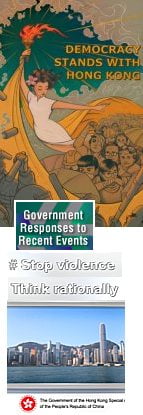This Diplomat article explains why China’s stance towards Taiwan alienates rather than wins over the population. Essentially, Beijing’s Leninist mindset presumes the masses to be led from the top down, so they focus on attacking government figures like Tsai Ing Wen.
This attitude is clear in their policy towards Hong Kong, where they blame ‘foreign influences’ or the schools for the population’s refusal to adopt correct attitudes.
At best, Beijing’s attempts to win Hong Kong people’s hearts and minds have been laughably bad (‘Belt and Road opportunities’). At worst, Chinese officials come across as alien, menacing and sinister – on a different wavelength from the city’s culture and identity.
Out of deference, Hong Kong government PR is now adopting the same phraseology, giving the impression that the local administration is not even talking to its own people. Officials’ boldest attempt at sophistication is a grotesque anti-protest rap video. Security Secretary John Lee’s claim that ‘foreign training’ is behind protesters’ organizational and media skills echoes Mainland attitudes that the populace is a malleable, dim-witted mass rather than millions of educated, thinking individuals.
The CCP has never before had to clamp down on a developed, free society. It took power by force in often impoverished, even semi-feudal regions. It has maintained control by suppressing opposition in places that are typically closed off to the outside world, and in societies that have little or no collective awareness of human rights or a heritage of a free press or rule of law.
In short, Beijing has no idea that its top-down coercive approach might be driving a significant part of the Hong Kong population to form a more cohesive and underground resistance movement.
Apparently unknown to John Lee, Hong Kong has a large middle class with cash to spare to raise millions for initiatives like crowdsourced ads in overseas media and the Spark Alliance for legal aid. (There’s also a wealthy Hong Kong diaspora.) As InvestHK confirms, this is a community rich in skills, including IT, design and creative talent that obviously runs rings around that of civil service spin doctors. The protest movement has developed aps and online forums to communicate tactical information and enable debate and decision-making while remaining leaderless.
A shadow support network is growing online. This includes legal assistance, transport and supplies pools, underground medical services and even a pro-movement labour exchange where protesters who have been fired can find jobs with ‘yellow’ employers.
Which brings us to the ‘yellow economy’ – encouraging consumers to patronize pro-democracy (and boycott pro-government) businesses (app link here). Not only does it punish pro-Beijing business owners, it is possibly paving the way to an alternative, mutually supporting, non-establishment/tycoon economy. It seems to make the government nervous.
Activists are also trying to organize pro-democracy unions (with a nod to 1980s Poland). Hong Kong has never been fertile ground for organized labour in the private sector (most unions are United Front bodies), so this sounds far-fetched. But then – everything listed above would have sounded far-fetched a year ago.
It would be so easy – to non-Leninists – for Beijing to absorb pro-democrats into the political system, step back from the Mainlandization menaces, and watch Hong Kong calm down and learn to love, or at least not loathe, the Chinese government. Giving the new pan-dem District Council members some minor responsibilities would be a start.
But – oh no. We can be pretty sure Beijing is out to crush crush crush. The question is: how quickly will the CCP inadvertently build up not just a semi-covert resistance-minded community, but an actual independence movement?


China never should have listened to a word Bertrand Russel said!
“But – oh no. We can be pretty sure Beijing is out to crush crush crush.”
Indeed. And like you noted, they’re failing hard at crushing anything aside from their own legitimacy here in Hong Kong.
Poor Mr. Luo. He is going to summon officials, issue directives, set targets, instruct his hand-puppet Commissioner of Police to ‘resolutely oppose’ subversive elements, only to find out that the population at large does not give a flying f. During the next big demo he will wonder why there are 3000 popo surrounding his office, having turned it into a virtual fortress.
@Joe Blow
Poor Mr. Luo has it worse than you think.
Someone higher up in the CCP food chain is running the HKPF.
He can’t instruct them to do doodly-squat.
Not sure if you can call the resistance movement “underground” when it is being done out in the open. There isn’t much the government can do right now against online organizing, crowd funding and yellow shops, but when that changes (it’s not a question of if), the resistance will have to make some heavy trade-offs between secrecy and broadness of participation.
There’s also a cryptocurrency that is worth absolutely zero but could be used to circumvent police state overwatch of protest related financing.
https://etherscan.io/token/0xfce9c2df151745e77150b9f35ab23cc81d3e8004
Noted on way home that all dustbins were ‘disappeared’ from TST MTR sometime after 2pm.
What next, flushing water to be disconnected???
Stock up your pantries with biscuits and tins of tuna!
ohhhh Mary. You scampish minx. Say more. Tell us about the panty biscuits.